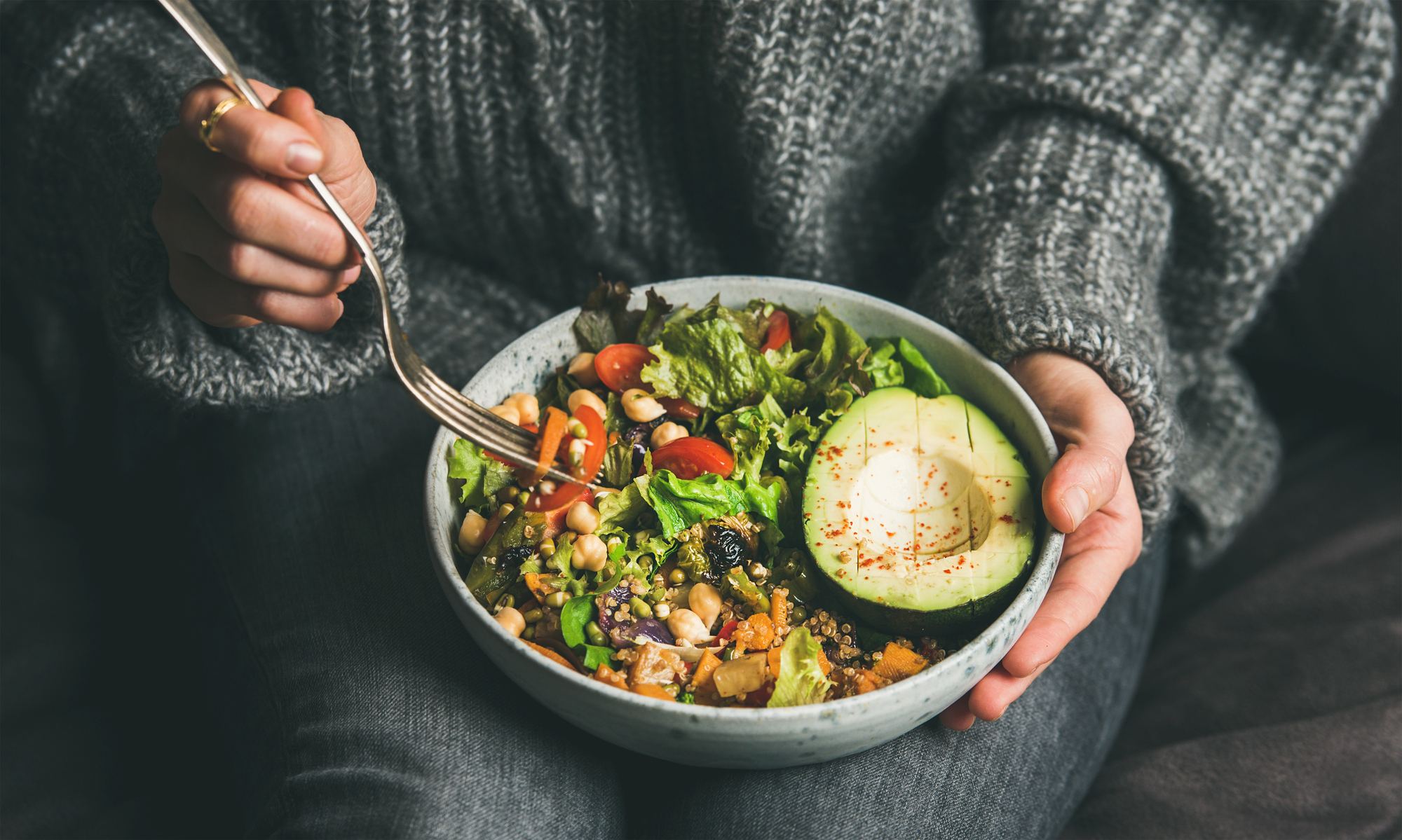Cacao chocolate offers more than just a sweet indulgence. This ancient superfood has been used for centuries, and modern science is uncovering its powerful benefits for mental clarity, mood, and cognitive function.
Consuming high-quality cacao chocolate can boost your brain power and elevate your mood. Rich in flavonoids and other beneficial compounds, cacao stimulates blood flow to the brain, potentially enhancing memory, focus, and overall cognitive performance.
You might be surprised to learn that cacao also contains natural mood-enhancing chemicals. These compounds can help reduce stress and promote feelings of well-being. By incorporating cacao into your diet, you may experience improved mental clarity and a more positive outlook.
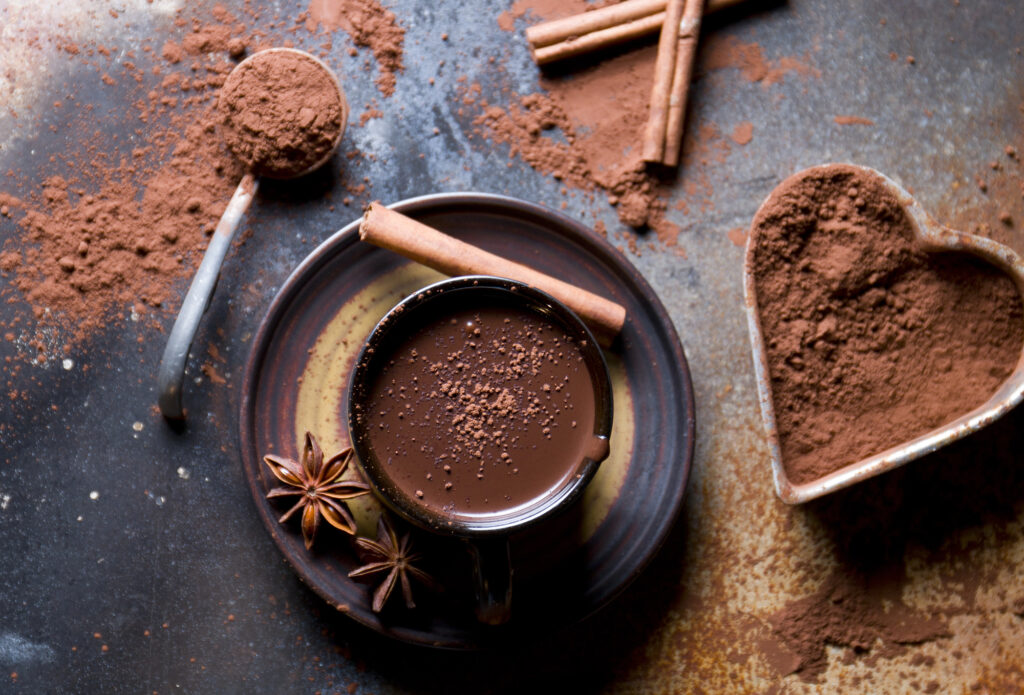
The Origins of Cacao
Cacao’s story begins in the lush rainforests of South America. Archaeological evidence suggests that the Olmec civilization cultivated cacao trees as early as 1500 BCE.
The Mayans and Aztecs later embraced cacao, believing it to be a gift from the gods. They used cacao beans as currency and prepared a bitter drink called “xocolatl” for ceremonial purposes.
Spanish conquistadors encountered cacao in the 16th century during their explorations of the Americas. They brought the beans back to Europe, where adding sugar transformed the bitter beverage into a sweet treat.
Cacao cultivation spread to other tropical regions around the world. West Africa produces most of the global cacao supply today, with Côte d’Ivoire and Ghana leading production.
Key cacao-producing regions:
- West Africa
- South America
- Southeast Asia
Cacao Chemistry: Active Compounds and Effects
Cacao contains several bioactive compounds influencing mental clarity, mood, and cognitive function. These components work synergistically to produce various effects on the brain and body.
Theobromine and Mental Performance
Theobromine is a key stimulant in cacao. It’s similar to caffeine but provides a milder, longer-lasting energy boost. Theobromine enhances your focus and alertness without the jitters often associated with coffee.
Consuming cacao products improves concentration and mental stamina. This compound also acts as a mild mood elevator, promoting feelings of contentment and well-being.
Theobromine’s effects typically last 4-6 hours, offering sustained cognitive benefits throughout your day.
Antioxidants in Cacao
Cacao is rich in flavonoids, powerful antioxidants that protect brain cells from oxidative stress. These compounds also improve blood flow to the brain, enhancing cognitive function.
Regular consumption of cacao flavonoids can boost your memory and learning abilities. Studies show improved performance on cognitive tests among individuals who consume high-flavonoid cacao products.
Flavonoids also have anti-inflammatory properties, potentially reducing your risk of neurodegenerative diseases as you age.
Magnesium and Brain Health
Cacao is an excellent source of magnesium, a mineral crucial for brain health. Magnesium plays a vital role in neurotransmitter release and nerve signal transmission.
Adequate magnesium intake supports your learning and memory functions. It also helps regulate your mood and can reduce symptoms of depression and anxiety.
Magnesium from cacao contributes to better sleep quality, indirectly improving your cognitive performance and mental clarity during waking hours.
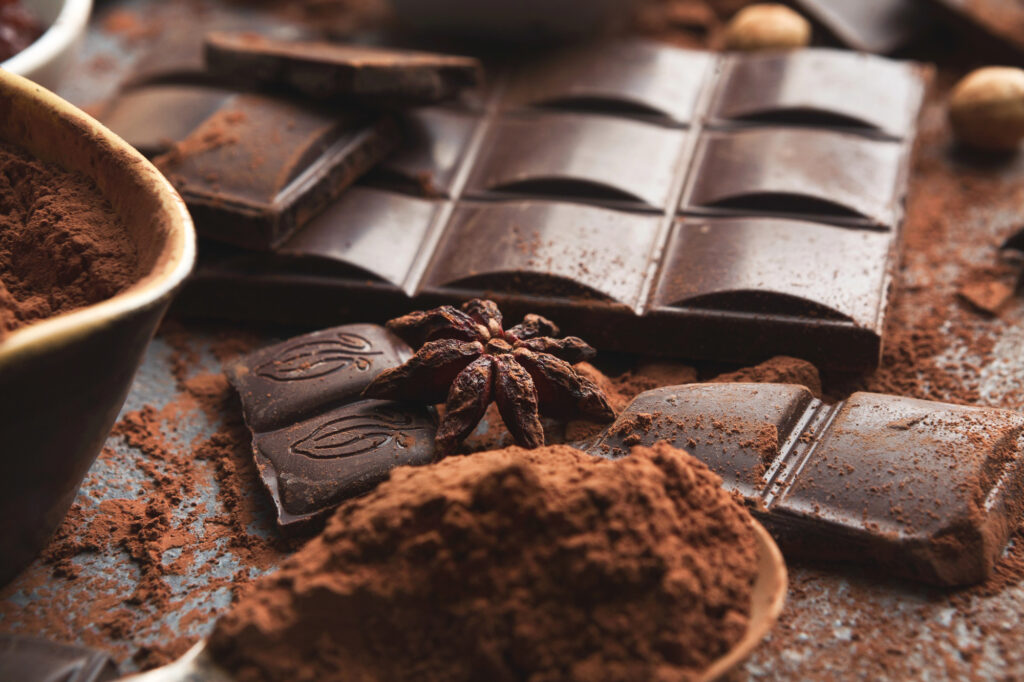
Cacao vs. Cocoa: Understanding the Differences
Cocoa and cacao are often used interchangeably, but they are different. Cacao refers to the raw, unprocessed form of chocolate, while cocoa is the processed version.
The seeds of cacao come from the Theobroma cacao tree. These seeds are harvested, fermented, and dried to create cacao beans. The beans are then cold-pressed to separate the fat (cacao butter) from the solids (cacao nibs).
Cocoa, on the other hand, is made by roasting cacao beans at high temperatures. This process alters the bean’s molecular structure, reducing its nutritional value.
Here’s a quick comparison:
Cacao
Raw, unprocessed
Higher in nutrients
More of a bitter taste
Used in raw desserts and drinks
Cocoa
Roasted, processed
Lower in nutrients
Sweeter taste
Used in baking and drinks
Cacao contains more antioxidants and flavonoids than cocoa. These compounds are linked to improved mental clarity and cognitive function. Cacao also retains more of its natural enzymes, aiding digestion.
When shopping, look for “raw cacao” products to get the most nutritional benefits. If you prefer a sweeter taste, cocoa can still be a healthier alternative to processed chocolate.
For optimal cognitive enhancement, aim for dark chocolate with at least 70% cacao content.
The Mood-Enhancing Benefits of Cacao
Cacao contains compounds that can positively impact your emotional state and mental well-being. Its effects on neurotransmitters and flavonoid content improve mood and reduce stress.
Neurotransmitters and Emotional Well-Being
Cacao influences key neurotransmitters linked to mood regulation. It boosts serotonin levels, promoting feelings of happiness and contentment. The presence of tryptophan, a serotonin precursor, further supports this effect.
Cacao also contains phenylethylamine, often called the “love chemical.” This compound can enhance focus and alertness while reducing fatigue, and it may contribute to feelings of euphoria and excitement.
Cacao contains anandamide, known as the “bliss molecule. ” This neurotransmitter binds to cannabinoid receptors, potentially promoting a sense of well-being and reducing anxiety.
How Flavonoids Improve Mood
Cacao’s rich flavonoid content plays a crucial role in its mood-enhancing properties. These antioxidants help reduce oxidative stress in the brain, which can negatively impact mood and cognition.
Flavonoids in cacao increase blood flow to the brain, potentially improving cognitive function and mood. They may also help regulate stress hormones like cortisol, leading to a more balanced emotional state.
Research suggests that regular consumption of flavonoid-rich cacao can reduce symptoms of depression and anxiety. This effect may be partly due to the compounds’ anti-inflammatory properties in the brain.

Cognitive Advantages Offered by Cacao Consumption
Cacao consumption provides numerous cognitive benefits. Its unique compounds and nutrients enhance mental performance and support long-term brain health.
Memory and Focus Enhancement
Cacao contains flavanols, which improve blood flow to the brain and boost short-term cognitive function. These compounds enhance memory, attention, and processing speed.
Studies show that consuming cacao before mentally demanding tasks can improve performance. You may experience increased alertness and better focus within hours of eating dark chocolate.
Cacao’s caffeine and theobromine content provides a gentle stimulant effect. Unlike coffee, this combination offers sustained energy without jitters or crashes.
The magnesium in cacao also plays a crucial role in cognitive function. It supports neurotransmitter release and helps regulate brain activity.
Long-term Cognitive Support
Regular cacao consumption may protect your brain as you age. Its antioxidants combat oxidative stress and inflammation, two factors linked to cognitive decline.
Research suggests that habitual chocolate eaters have better cognitive function in later life. You may reduce your risk of age-related memory loss and dementia by incorporating cacao into your diet.
Cacao’s flavonoids promote neuroplasticity, helping your brain form new neural connections. This adaptability is key to maintaining cognitive health over time.
The mood-boosting effects of cacao can indirectly support long-term brain health. You create an environment conducive to optimal cognitive function by reducing stress and improving overall well-being.
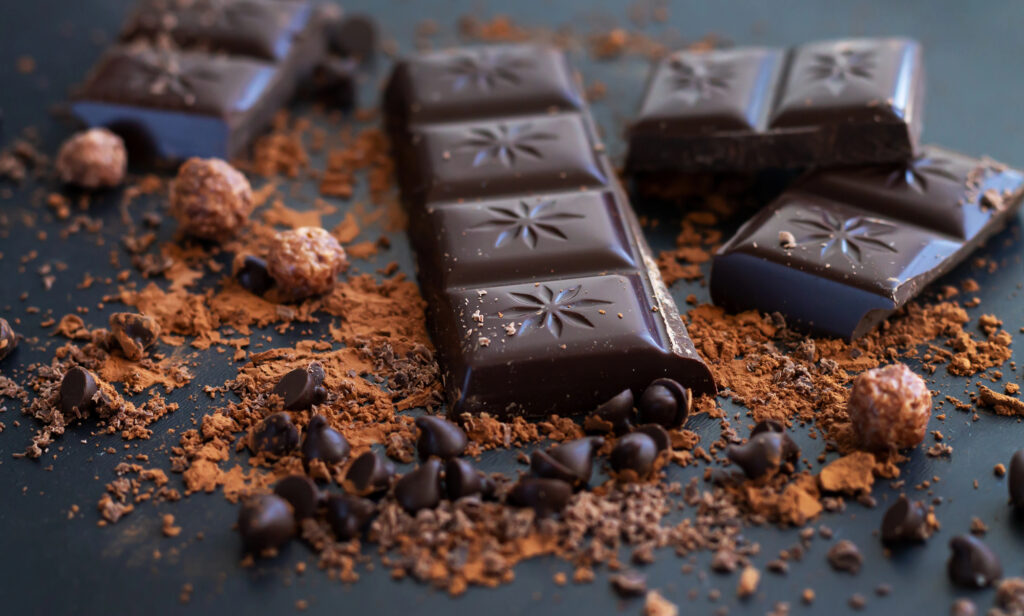
Integrating Cacao into Your Diet
Adding cacao to your daily routine can be simple and delicious. There are various ways to incorporate this superfood for its mental and cognitive benefits.
Best Practices for Cacao Consumption
Start with small amounts of cacao and gradually increase your intake. Aim for 1-2 tablespoons of raw cacao powder or nibs daily. Choose organic, minimally processed cacao for maximum nutrients.
Consume cacao earlier in the day to avoid potential sleep disruptions due to its caffeine content. Pair it with healthy fats like nuts or avocado to enhance nutrient absorption.
Cacao can be mildly dehydrating, so stay hydrated when eating it. Be mindful of added sugars in commercial cacao products. Opt for unsweetened versions and control sweetness yourself with natural alternatives.
Delicious Cacao Recipes
Morning Cacao Smoothie:
- 1 banana
- 1 tbsp cacao powder
- 1 cup almond milk
- 1 tsp honey
- Ice cubes Blend until smooth.
Cacao Energy Balls: In a food processor, mix 1 cup dates, 1/2 cup nuts, 2 tbsp cacao powder, and 1 tbsp coconut oil. Roll into balls and refrigerate.
Try sprinkling cacao nibs on yogurt or oatmeal. Add cacao powder to your coffee for a mocha flavor. For a rich, complex taste, experiment with cacao in savory dishes like chili or mole sauce.
Potential Health Risks and Considerations
While cacao chocolate offers many benefits, it’s essential to be aware of potential risks. You should consume it in moderation, as excessive intake can lead to unwanted effects.
Cacao contains caffeine and theobromine, which may cause:
- Increased heart rate
- Insomnia
- Anxiety
- Digestive issues
If you’re sensitive to these stimulants, limit your consumption or avoid cacao altogether.
Cacao can interact with certain medications. Consult your doctor if you’re taking:
- Antidepressants
- Blood thinners
- Diabetes medications
Some individuals may be allergic to cacao. Watch for symptoms like:
- Skin rashes
- Difficulty breathing
- Swelling of the mouth or throat
Cacao is high in calories and fat. Overconsumption may contribute to weight gain and related health issues. For the most benefits, choose dark chocolate with a high cacao content and low sugar.
If you are pregnant or breastfeeding, moderate your intake. The caffeine and theobromine in cacao can affect your baby.
Be cautious of contaminants in cacao products. Look for reputable brands that use organic, fairtrade cacao to minimize pesticide exposure and heavy metals.
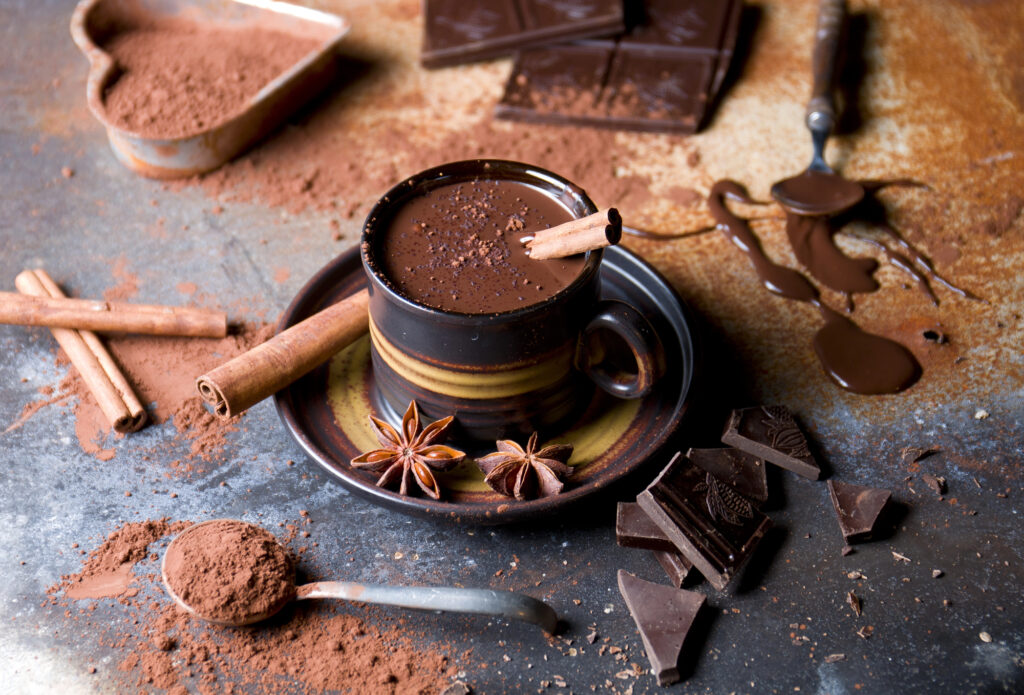
Sustainable and Ethical Sourcing of Cacao
Sustainable and ethical sourcing of cacao is crucial for the chocolate industry’s long-term viability. You can support these practices by choosing chocolate from companies committed to fair trade and environmental responsibility.
Many cacao farmers face challenging working conditions and low wages. Ethical sourcing ensures farmers receive fair compensation and have access to proper resources, improving their livelihoods and promoting community development.
Sustainable farming practices protect biodiversity and reduce environmental impact. These methods include:
- Shade-grown cacao
- Organic farming techniques
- Water conservation
- Reforestation efforts
Look for certifications like Fairtrade, Rainforest Alliance, or UTZ on chocolate products. These labels indicate adherence to specific sustainability and ethical standards.
Some chocolate companies work directly with cacao farmers, establishing long-term partnerships. This approach ensures quality control and fair treatment throughout the supply chain.
By choosing sustainably and ethically sourced cacao, you contribute to:
- Improved farmer welfare
- Environmental conservation
- Preservation of traditional farming methods
- Higher-quality chocolate production
Your purchasing decisions can significantly impact the cacao industry. Supporting responsible brands encourages more companies to adopt sustainable and ethical practices.

